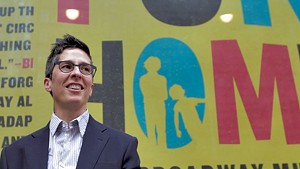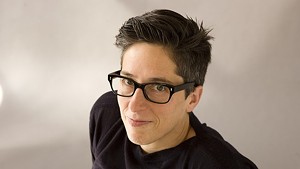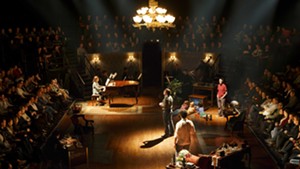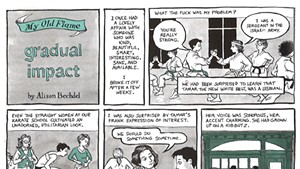This review was contributed by former Seven Days associate editor Ruth Horowitz, who now lives in Providence, R.I. She and her husband, David Christensen, recently headed to Manhattan to see Fun Home the Musical, at the Public Theater off-Broadway. It is based on Fun Home, the graphic memoir, written/drawn by Vermont-based cartoonist Alison Bechdel. This originally appeared in Ruth's blog, Giving Up the Ghost.
David and I took a quick trip to New York last weekend to see Fun Home, the incredible musical based on Alison Bechdel’s incredible 2006 graphic memoir about her closeted gay father’s suicide not long after she came out as a lesbian.
Alison was writing Fun Home at the same time that I began to write my novel. We swapped drafts. She commiserated with me when I faltered (I’m still fussing with my book), and our whole family celebrated with her as she finished her project — to much acclaim.
The “best of” lists, the interviews, the awards — all that success made sense to me. But when Alison told me someone had optioned the rights to turn Fun Home into a musical, I wasn’t convinced. That is, I thought it was the most ridiculous idea I’d ever heard. The book is so intricately crafted, and makes such rich use of the graphic-novel format, the rhymes and ironies and reiterations between words and pictures so perfectly expressing the narrative’s conflicted point of view — how could that possibly translate to the stage?
I was skeptical. But also intrigued. So naturally, when I had a chance to attend an early “lab” performance of the play in progress, I bought tickets, and David and I Megabussed it down to New York to see the show.
That was a strange experience. But not for the reasons I had anticipated. The set featured a meticulous replica of Alison’s Bolton studio, a room I had been in lots of times, but not since David and I moved out of state, a few years earlier. I couldn’t stop staring at it. Actor Beth Malone’s portrayal of the adult Alison was so spot-on, with so many gestures and postures and inflections that were just right, I couldn’t stop noticing the few she got wrong. And I was so curious about which parts of the book the play would leave in, I couldn’t stop thinking of the parts it left out.
Even with all those personal distractions, lots of parts of the play blew me away — the performances, the songs, some achingly poignant scenes. But as a whole, it felt disjointed, uneven, off balance.
Fun Home is a coming-out story, a coming-of-age story, a family story, a story about growing up in a funeral home, and a story about coming to terms with the past. It’s also a story about the necessary and dangerous business of turning our lives into stories — necessary because storytelling helps us make sense of events; dangerous because how can we know if the stories we tell ourselves accurately convey the facts, or are just the version we want to be true?
In Fun Home the book, Alison the grown-up lesbian cartoonist comes back to the same memories again and again, searching for clues and trying out different interpretations. The approach lets the reader peer deep inside the narrator’s mind, but keeps people and events at a distance. The story is moving and absorbing. But it never lets you forget that you’re reading.
Fun Home the musical is also narrated by grown-up Alison, and also proceeds nonchronologically, circling back over the same events to pick out new details and dig deeper under the surface. The three actors who play Alison at different ages — child, college student and adult — often appear on the stage together. A problem with that early version was that Alison the adult wasn’t nearly as compelling as her former selves.
Which would you rather watch, a little girl going gaga over her first butch dyke, a college student bringing her first girlfriend home to meet her parents, or a cartoonist trying to figure out which caption to write? The introspection and self-correction that make the book so thought-provoking and multilayered just got in way of the play.
When I heard the play was opening for real, of course I bought tickets, and David and I headed back to New York. But I was nervous.
Turns out, I didn’t need to be.
Fun Home the Musical never stops moving. Events don’t proceed chronologically. Time keeps circling back — literally, on a turntable stage that lets us see two associated events simultaneously. Songs circle back, too, the same lyrics taking on new meanings between the first chorus and the last. Set pieces also rhyme. The same door that opens to Alison’s father’s closet recycles as the entrance to the Gay Union at Alison’s college.
Alison the tortured cartoonist still narrates. But for most of the play she’s a quiet witness, letting her memories speak for themselves. They do that eloquently. And because she has held back so much over the course of the play, when she finally does fully express herself at the show’s climax, the impact is all the more powerful.
As for those personal associations I found so distracting the first time, seeing the play again, I wasn’t bothered at all. In part, that was because I’d already seen it once. But it was also because the play didn’t put as much emphasis on mirroring reality. Alison’s replica studio was reduced to a single desk. The actor playing adult Alison was more natural and less of a mimic. The script strayed further from the book. And that’s the real point, I think.
If the genius of Fun Home the book is in how perfectly it deploys the tools of the graphic novel, the genius of Fun Home the musical is in how well it uses the medium of the stage. Composer Jeanine Tesori, playwright Lisa Kron and director Sam Gold haven’t just created a stage version of Alison’s book. They have cut through the book’s baroque layers and brought out its essence. And they’ve done that by making the story their own.
Photo outside the Public Theater by Cathy Resmer.










Comments
Comments are closed.
From 2014-2020, Seven Days allowed readers to comment on all stories posted on our website. While we've appreciated the suggestions and insights, right now Seven Days is prioritizing our core mission — producing high-quality, responsible local journalism — over moderating online debates between readers.
To criticize, correct or praise our reporting, please send us a letter to the editor or send us a tip. We’ll check it out and report the results.
Online comments may return when we have better tech tools for managing them. Thanks for reading.